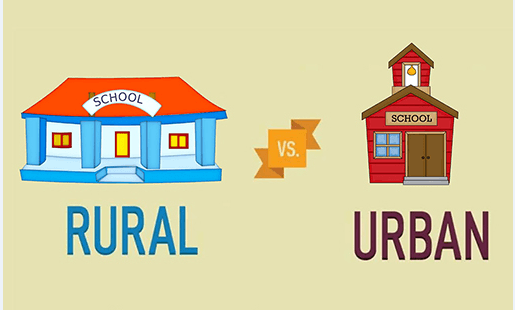How CBSE Schools Are Closing the Gap Between Urban and Rural Education
Introduction
Education in India has long been marked by a stark divide between urban and rural areas. While cities have access to world-class schools with advanced learning methods, rural regions often struggle with outdated curriculums, a shortage of trained teachers, and inadequate infrastructure. However, CBSE schools in India are actively working to bridge this gap by offering standardized, high-quality education across urban and rural settings.
Through the adoption of progressive education methods and the expansion of infrastructure, Top CBSE Schools in India are ensuring that students in villages receive the same learning opportunities as those in metropolitan cities. This transformation is helping to create a more equitable education system, empowering rural students to compete on a national and global level.
Challenges in Rural Education
Before understanding how CBSE schools in India are closing the urban-rural gap, it is crucial to recognize the key challenges rural education faces:
Limited Access to Quality Schools: Many villages do not have secondary or higher secondary schools, forcing students to travel long distances or drop out.
Shortage of Trained Teachers: A lack of qualified educators affects the quality of learning, with many schools relying on underqualified staff.
Infrastructure and Digital Divide: Many rural schools lack basic facilities like libraries, science labs, and internet access, making modern learning difficult.
By addressing these issues,the Best CBSE Schools in India are making a significant difference in rural education.
How CBSE Schools in India Are Bridging the Gap
CBSE’s standardized curriculum ensures that students, regardless of location, receive a uniform and high-quality education. Some key ways CBSE schools in India are closing the urban-rural education divide include:
Expanding Schools to Rural Areas
New CBSE-affiliated schools are being established in smaller towns and villages.
Government and private organizations are investing in rural education infrastructure.
Standardized Syllabus and Exams
CBSE schools in India follow the same syllabus, ensuring students in rural areas have access to the same learning material as their urban counterparts.
Progressive Education Methods
Hands-on learning, project-based assessments, and critical thinking exercises are making education more engaging.
By implementing these measures, Best CBSE Schools in India are providing rural students with a strong educational foundation.
The Role of Technology in CBSE Education
Technology is playing a crucial role in making quality education accessible to rural students. Top CBSE Schools in India are incorporating:
Smart Classrooms: Digital boards and online study materials help bridge the learning gap.
E-Learning Platforms: Many rural CBSE schools use government-supported digital resources to provide high-quality education.
Hybrid Learning Models: A mix of in-person and online classes ensures students can continue learning despite infrastructure challenges.
This tech-driven approach is making progressive education more accessible, even in remote areas.
Progressive Education in CBSE Schools
Progressive education focuses on skill development, creativity, and practical knowledge rather than rote learning. CBSE schools in India are implementing:
Activity-Based Learning: Encouraging students to learn through hands-on projects.
Career-Oriented Education: Introducing vocational training and soft skills development.
STEM and Innovation Labs: Providing rural students with opportunities to explore science and technology.
These initiatives make Best CBSE Schools in India a game-changer in improving rural education.
Government Support and Policies
The government plays a key role in supporting CBSE schools in India through:
NEP 2020 Initiatives: Encouraging multilingual education and flexible curriculums.
Scholarship Programs: Providing financial aid to rural students.
Teacher Training: Enhancing the quality of education in Top CBSE Schools in India.
These policies are crucial in making progressive education accessible to all.
Infrastructure Development in Rural CBSE Schools
Best CBSE Schools in India are focusing on:
Modern Classrooms: Improving facilities like libraries and computer labs.
Better Transportation: Ensuring students can easily reach schools.
Digital Connectivity: Providing high-speed internet for e-learning.
Such developments are essential for bringing rural education up to par with urban standards.
Success Stories of Rural CBSE Schools
Several CBSE schools in India have transformed rural education, leading to:
Rural students excelling in national-level exams
Increased enrollment rates in higher education
Successful community-driven education models
These success stories highlight the potential of progressive education in bridging the gap.
Conclusion
The divide between urban and rural education in India is gradually narrowing, thanks to the efforts of CBSE schools in India. Through standardized curriculums, progressive education models, and the use of technology, these schools are ensuring that every child, regardless of location, has access to high-quality education.
As the country moves forward, Top CBSE Schools in India will continue to play a crucial role in empowering rural students, providing them with the skills and knowledge needed to compete in a rapidly evolving world.
FAQs
How are CBSE schools helping rural students?
CBSE schools in India provide standardized education, modern infrastructure, and digital learning tools to rural students.
Why is progressive education important in CBSE schools?
Progressive education encourages critical thinking, creativity, and hands-on learning, making education more effective.
What role does technology play in bridging the urban-rural education gap?
Top CBSE Schools in India use smart classrooms, online courses, and digital learning tools to enhance education in rural areas.
How does the government support CBSE schools in rural areas?
The government provides funding, training, and scholarships to help CBSE schools in India improve education in villages.
What is the future of CBSE education in rural India?
With ongoing reforms and innovations in progressive education, rural students will have better learning opportunities and career prospects.

